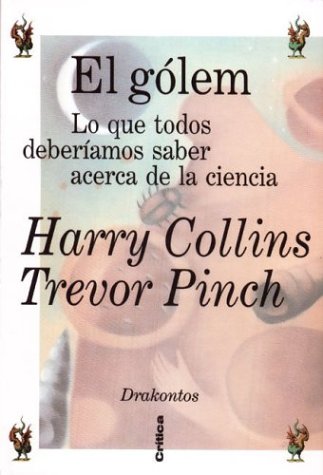Canto
2 total works
In the very successful and widely discussed first volume in the Golem series, The Golem: What You Should Know about Science, Harry Collins and Trevor Pinch likened science to the Golem, a creature from Jewish mythology, a powerful creature which, while not evil, can be dangerous because it is clumsy. In this second volume, the authors now consider the Golem of technology. In a series of case studies they demonstrate that the imperfections in technology are related to the uncertainties in science described in the first volume. The case studies cover the role of the Patriot anti-missile missile in the Gulf War, the Challenger space shuttle explosion, tests of nuclear fuel flasks and of anti-misting kerosene as a fuel for airplanes, economic modeling, the question of the origins of oil, analysis of the Chernobyl nuclear disaster, and the contribution of lay expertise to the analysis of treatments for AIDS.
El exito obtenido por la Historia del tiempo, de Stephen Hawking, propicio la creacion, en 1991, de esta coleccion de divulgacion cientifica que fue dirigida durante largo tiempo por dos personas de formacion humanistica: de ahi ciertas contaminaciones al inicio de la coleccion. Sin embargo, cuando Jose Manuel Sanchez Ron se hizo cargo de ella, dio un aprobado a la gestion anterior. En esta coleccion, quiza la mas ambiciosa de todas las de divulgacion cientifica que se editan en espanol, se han publicado obras de Stephen Jay Gould, Carl Sagan, lan Stewart, Edward O. Wilson, Antonio Damasio, Luigi Luca Cavalli-Sforza, Ilya Prigogine, John D. Barrow, Rita Levi Montalcini, Richard P. Feynman, Roger Penrose, Steven Weinberg, Rachel Carson, Francisco Garcia Olmedo, Francisco Yndurain o Jose Manuel Sanchez Ron. Este fascinante libro parece a primera vista una coleccion de historias sobre episodios curiosos, discutibles o fraudulentos de la investigacion cientifica pero su finalidad no es la de divertir, sino la de mostrar como funciona en realidad la ciencia.

